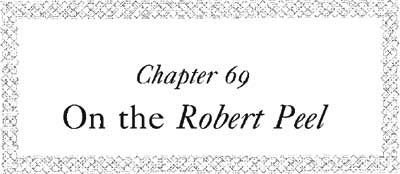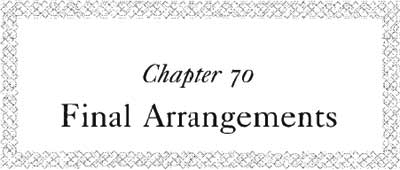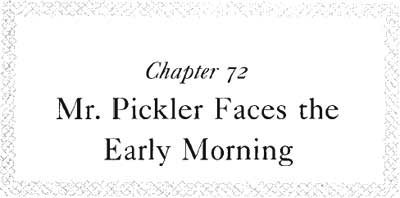Escape From Home (31 page)
Authors: Avi


N
ot a word,” Fred reminded Laurence.
The boys halted the barrow at the bottom of the gangway. “What you got there?” the man with the papers demanded.
“Hats,” Fred said.
The man looked at the label on the box, riffled through his papers, then made a mark on them. Finally, he marked an X on the box with a piece of chalk. “You're on,” he said. “Keep moving.
“Hold it!” the constable barked. He leaned forward and peered at Fred. Then he turned to Laurence, who was looking down and away, and chucked him under the chin so as to raise his dirty face. He studied it.
“You're holding everything up,” the other man objected.
“Never you mind,” the constable growled, but even so, he drew back and nodded to the boys. “Get on with it, you filthies.”
Leaning into the barrow, the two boys pushed up the gangway and onto the ship. “Glad we dirtied you,” Fred said under his breath.
At the top of the gangway, they were met by another man. He peered at the mark on the box. “Bottom hold,” he said. “Keep on movin'.”
Laurence, who had never been on a ship before, was astonished by the complexity of decks and rigging.
“You'll have time enough to gawk later,” Fred cautioned as a navvy shouted at them, pointing to where the cargo hatch had been pulled back. It left a gaping hole on the ship's deck through which goods meant for the hold were being lowered by block and tackle attached to the lowest spar on the main mast.
No sooner did the boys take their crate out of the barrow than deck workers flung ropes around it and tied them fast.
“We got to set it right!” Fred called. “Come on!” he shouted to Laurence as he leaped on the box and clung to the encircling ropes.
Laurence, seeing what Fred had done, hardly thought but jumped too, just having time to get a grip before the entire crate was yanked into the air, swung about, then dropped almost instantly into darkness. It happened so fast Laurence had to gasp for air.
“Hang on!” Fred called.
They landed with a harsh thump. Fred leaped off. Laurence fell. He looked around him. A few oil lanterns revealed that they were in the bottom cargo hold. Beams of dark wood crisscrossed overhead, not unlike those he'd seen in the hulks, but here the air was murky and so rank with the stench of sewerlike filth that he gagged.
Not far from where they stood, he could see workers hauling already deposited cargo and lining it in rows much as in the warehouse.
As Laurence stared about, Fred was working fast to untie their crate. “Come on!” Fred cried. “Give a hand!” Laurence hurried over.
When the crate was clear of ropes, Fred took hold of them and gave them a jerk, a signal that the lines were clear. Up they flew.
“Have you been here before?” Laurence asked.
“Rather work here than the workhouse,” Fred spit out. “Come on now, let's get the thing in place,” he said. The boys pushed and shoved the crate along the floor, wedging it as far as possible into the ship's most forward section. No other boxes could be fitted in before it.
“All pretty,” Fred said, looking about furtively. Reassured that they were alone, he began to pull off the boards they had previously loosened. As soon as the three were partly off, he turned to Laurence. “There you are. In you go.”
Laurence had known what they were doing, but now that the moment was at hand, his fear burst upward in him. He stared at the crate. “It's like a coffin,” he whispered. “How long will I have to stay in there?”
“Ship's supposed to slip by the morning tide,” Fred answered. “Soon as she clears the Mersey, your friend can get you.”
“But what if he doesn't?”
“He promised he would.”
Laurence looked around. “What if they put another box against it?”
“No chance,” Fred assured him. “That's why I put it here.”
“You're sure Patrick will come?” Laurence said. His heart was thudding.
“You said you saw him on the quay, didn't you?”
Laurence nodded.
“I'll tell him where you are soon as I leave. Get in now.”
Laurence had to force himself into the box. He could stand up, but it was impossible to sit. “Wait!” he implored, holding a board out with a hand. “Swear that you'll tell Patrick where I am.”
“Of course I swear. Just don't you worry. It'll be fine.”
“But what will I eat?”
“You can go without for a day. I've done it lots of times.”
Laurence closed his eyes and tried to breathe slowly. He did not want to see Fred replace the third board. All the same, he heard the nails inching in.
He opened his eyes to darkness and ran his fingers over the rough, splintery wood. Only a faint glimmer of light glowed through the cracks in the boards.
“You all right in there?” Fred whispered through a crack.
“I think so.” Laurence kept swallowing hard. He was panting for breath.
“I'm marking the box now.” Fred took the chalk from his pocket and circled the X. “You're all set now,” he cried. “I'm going.”
“Tell Patrick
exactly
where I am!”
“I will.”
“Good-bye,” a tearful Laurence called.
“And when you come out of it,” Fred said, laughing, “you'll be in heaven.”
Or hell, Laurence thought.

F
red made his way out of the hold and down the ship's exit gangway without attracting any attention. He searched the quayâit was quite dark nowâand saw the crowd of emigrants. More than a hundred were already there. He worked his way through them, trying to find Patrick, whom he finally spotted sitting under a quay lamp with his sister and her friend.
“I'm here,” Fred said, slipping up to Patrick.
Patrick jumped up. “Where's Laurence?” he asked.
“Not so loud,” Fred cautioned, looking around to make sure no one had heard. Only Maura and Mr. Drabble had noticed him.
“Listen hard now,” Fred said, keeping his voice low. “He's on the ship in a crate for hats. Bottom hold. You can't get any lower. Can you remember that?”
“Bottom hold,” Patrick repeated.
“Right. And he's as far forward as we could go. I marked it. Made a circle around a cross mark. When you're away from Liverpoolâout to seaâfind it and open it up, and he'll be there. Now don't you forget him,” Fred warned, “or your friend won't be breathing much.”
“Fred!” The call came from across the quay.
Fred turned. Mr. Orkin of the Lime Street Runners Association was pushing his way through the crowd.
“Don't you forget him!” Fred repeated to Patrick as he backed away. The moment he reached open ground, he began to sprint. The other runner, impeded by the crowd, struggled to pursue him.
Patrick watched them go even as he tried to absorb what he had heard. The next moment, however, he was grabbed by the shoulders.
“Patrick O'Connell!” Maura cried. “I'm begging you. There's too much danger with that boy. Wasn't it bad enough to have our home tumbled, Mr. Morgan chasing you, and our mother abandoning us? Do you want English law crashing down on our heads too and we barely finding our way!”
“But, Maura,” Patrick cried, “it's too late. He's there, on the ship, waiting for me! If I don't get him out, he'll die!”
Maura closed her eyes tightly and pressed her hands in prayer. “Dear God,” she prayed with the deepest fervor, “in all the goodness of Your sacred heart, protect us now!”

F
red slipped away easily. But once free he had to decide where to go. It was clear to him that the whole Lime Street Runners Association was now out in force trying to catch him. He needed a place to hide for a while.
He considered going back to the hulks. But he wanted the satisfaction of seeing the
Robert Peelâ
and Laurenceâclear Liverpool first. He would deal with the rest later.
His mind made up, he headed north along Regent Street toward Sandon Basin. There, at the outlet to the river, he would have a sweeping view of the Mersey, a perfect spot from which to watch the
Robert Peel
when it came downstream.
After a fast trot through the dark, Fred crept behind one of the towers built to contain the machines that opened the basin bridge. Some work was being done on the tower, and building stones were scattered about the ground. A small workman's shed had even been constructed to keep tools from the rain. A perfect hiding place.
Fred eased the shed door open, crawled inside, and made room for himself to sit. After barricading the door, he leaned back against the wall. He felt content, certain he had done everything possible to thwart Ralph Toggs. As for Laurence, it was up to the Irish boy now.


I
t was barely daybreak when Mr. Phineas Pickler, bowler upon his head, a bright brass telescope tucked under his arm, stepped out of the Royalton Hotel's doorway and squinted into a murky sky. On the curb, waiting next to a hansom cab, was Ralph Toggs.
“Morning, mate,” Toggs said, offering up a lazy salute. “Hope you passed the night in comfort.”
Mr. Pickler turned to consider the young man coldly. “I did,” he replied.
Toggs laughed. “I was having a rousing good time myself andâ”
“Mr. Toggs,” the investigator interrupted, “I am not the least bit interested in the way you spent your evening. Is everything in readiness as ordered?”
“Got the boat you wanted,” Toggs replied, somewhat chastened. “She's a skiff, and she can buzz if you need it.”
“Good. Then, please, let us get on with it!”
“If you say so.”
“I do say so,” Mr. Pickler returned stiffly. “You may ride with the driver,” he said, and pulled himself into the carriage.
Mr. Pickler settled himself upon the seat and laid the telescope to one side. Then he removed his bowler and stared into it. It was profoundly empty. But then he was not happy with the day, himself, or, for that matter, anything. He would have given a great deal to be home with his family.
The cabdriver turned to Toggs. “Where we going, mate?”
“Sandon Basin.”
